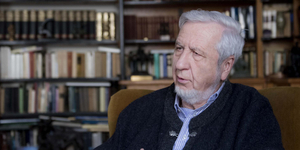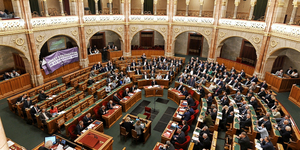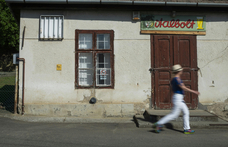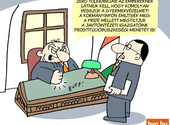 © hvg.hu |
At first glance, the change looks sudden, caused by a series of Fidesz blunders. Viktor Orbán's statement that the republic is only a garment warn by the nation could have been taken as a slip of the tongue. One by one, uncivilised outbursts by István Mikola, Zsolt Semjén, László Kövér and Zsolt Bayer could be interpreted as moves by incautious and not particularly intellectual politicians whose tongues outstripped their brains in the heat of the campaign.
This interpretation seems to be supported by several factors. Viktor Orbán called on his party to talk more carefully. The other parties were quick to sound the warning bell (the republic is in danger!). Zsolt Semjén's statements raised protests from intellectuals. Other than in the openly campaigning right-wing media, these outbursts were ill-received in the press as well. The opposition was forced to explain itself.
Though Fidesz's ideological offensive may prove to have been a mistake, I do not believe that these were just missteps by thoughtless politicians. Even if the execution was flawed, even if Mikola and his colleagues were interpreted with excessive creativity, there are signs that this offensive was centrally planned. The fact that these rhetorical incidents came in one flood - a party that has shown itself to be disciplined can hardly so many mistakes in a row. Another reason to believe that the offensive was planned was that the incidents make good sense for Fidesz.
First of all, the attacks were concentrated on the Free Democrats. The polls show it is the liberal party's showing in the election that will decide who forms a government after the elections. Since ignoring the smaller government party was not bringing the desired result, negative campaigning seemed a logical, if risky, step.
The attacks focused on those aspects of liberalism that most repulse right-wing voters: gay rights and lifestyle pluralism, seen from the Right as attacks on the institution of the family, civil rights activism and the promotion of libertinism and deviance. The separation of church and state is seen as persecuting the church. There are broad swathes of the Right who think that these tenets of modernity are not simply wrong, but the work of the devil himself. Those who believe these ideas are simply degenerate moral cyphers. Such voters believe that supporters of these ideals cannot be honest, and cannot wish to serve the good of the country. They must be conspirators, working to bring down Hungary.
Since these voters form the most convinced members of the right-wing camp, it is possible that Fidesz strategists decided to focus on them in order to make the more likely to vote in a close election campaign. But it cannot be ruled out that these moves were always planned for the final stretch. In any case, whether this is an ad hoc or a planned move, the advantage to Fidesz is that this rhetoric can entice back voters who are drawn towards the Hungarian Truth and Life - Movement for a Better Hungary wing of politics. Since this ideological diversion leads to polarisation, it makes the task of the Hungarian Democratic Forum even harder.
Risky experiment
But this strategy holds immense risks. Becoming the main enemy of the Free Democrats guarantees the smaller party space in the media. It undermines anti-communist rhetoric, if this has not already been fully accomplished by bringing Kádárist figures into the Fidesz camp. Finally, there is much argument within Fidesz about whether it is desirable to open the party up to the extreme right. Moderates fear that gestures to the far right may alienate centrist voters, meaning the party will lose more than it gains. The party is alive to this danger: even as Semjén and Kövér were bating the Free Democrats, Viktor Orbán was offering liberal voters a home inside Fidesz.
It would be an astonishing achievement if Viktor Orbán were able to make this a genuinely tempting offer for liberal voters. But there is no doubt that Mikola, Semjén and Kövér, however repulsive their style, are not sailing on the traditional seas of the Hungarian Right. They are implacable social conservatives. But for liberals, even this is unbearable.
But the offer to the far right is interesting, nonetheless. This kind of social warrior conservatism is less a Western European tradition than an American one. Social conservatism is an important aspect of the Republican coalition. Are Fidesz strategists following the Republican Party's script? It cannot be ruled out, since Viktor Orbán recently told HVG.hu that he was a convinced atlanticist, dedicated to stamping out all traces of anti-Americanism within his party. It would be easier for him if the far right's antisemitism and anti-Americanism could be replaced by a merciless struggle against gay rights, liberal drug policy, feminism, secular humanism, degrading pop music and ungodly postmodern literature.
This would be an achievement in terms of Hungarian political culture as well, but not as much as it would seem at first sight. Many complain about the Americanisation of Hungarian politics. They are thinking of campaign 'shows', confetti and light-shows. But Hungarian politics is very American on a much more fundamental level: it has a paranoid style, as damaging here as there. This would not be changed by importing divisive ideas from over there.
I do not know what this sudden hardening on the Fidesz side will bring. In all likelihood, the more paranoid the Free Democrats' and the Socialists' response, the greater the danger of it delivering. Experience shows that ideological hysteria is most effective at driving people away from politics. And polls show that the Socialists have the most uncertain voters.

















